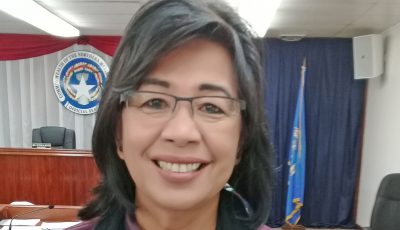‘Delegation may regulate Tinian gambling’
The CNMI Supreme Court issued its opinion yesterday in Blanco-Maratita v. Borja, 2017 MP 6, affirming the trial court’s determination that three local laws enacted by the Tinian Legislative Delegation are constitutional.
The high court also clarified the length of the terms of the commissioners on the Tinian Casino Gaming Control Commission.
In 1989, voters on Tinian, also called the second senatorial district, passed a local initiative to legalize gambling and establish the commission on Tinian through an enabling act, later revised as the Revised Tinian Casino Gaming Control Act of 1989.
In 2004 and 2013, the Tinian Legislative Delegation enacted two local laws, Tinian Local Law 14-1 and TLL 18-5, amending the revised act to, among other things, reduce the casino license application fee, lower the minimum age of casino employees from 21 to 18, and rearrange gambling tax structures.
In 2014, the Tinian Legislative Delegation enacted Tinian Local Ordinance 18-3 to make appropriations for the commission’s operating budget.
Former commission officers Lucia L. Blanco-Maratita and Lisa-Marie B. Aguon sued Tinian municipal treasurer Charlene M. Lizama, later replaced by Maria B. Borja; Tinian Mayor Joey P. San Nicolas; and the Tinian municipality, claiming that the three local laws were unconstitutional.
Blanco-Maratita and Aguon also argued that a commissioner’s term runs for six years from the date of his or her individual confirmation, not, as the Tinian government posits, by dates predetermined by the 1990 initial appointments to the commission.
The trial court ruled in favor of the Tinian government both as to the constitutionality of the local laws and the commissioners’ terms.
On appeal, Blanco-Maratita and Aguon argued the laws should be found unconstitutional because: 1) Article 21 of the NMI Constitution prohibits a legislative delegation from regulating gambling or amending an existing gambling law enacted by local initiative; 2) the laws unduly and unreasonably interfere with the second senatorial district’s constitutional right to effectively establish gambling.
Additionally, Blanco-Maratita and Aguon asserted that TLO 18-3 violates the principle of separation of powers because, by capping the number of positions in the commission and the salary for each position, it impermissibly interferes with the Executive Branch.
The CNMI Supreme Court held that pursuant to Article 21, Section 6 of the NMI Constitution and Local Law Act of 1983, a legislative delegation is empowered to enact local law regulating gambling, including amending a gambling law enacted by local initiative.
The high court stated this reading does not conflict with the Constitution because Article 21 only applies to who may lift the prohibition on gambling; it does not prohibit the legislative delegation from regulating gambling once the prohibition on gambling is lifted.
The high court also determined the three local laws in question do not unduly and unreasonably interfere with the second senatorial district’s constitutional right to effectively establish gambling, because TLL 14-1 and TLL 18-5 reasonably relate to the governmental interest of promoting the competitiveness of the gambling industry, and the denial of a salary increase of a single employee under TLO 18-3 is not undue or unreasonable interference in these circumstances.
The high court further held the separation of powers principle was not implicated because the Tinian Legislative Delegation and the commission are not coequal branches of government.
Further, as the commission is independent from the mayor, any interference with the commission does not impute interference with the mayor’s function.
On the commissioners’ terms issue, the high court held that the revised act as a whole provides for a staggering system with terms not strictly bound by dates predetermined by the 1990 initial appointments to the commission, but limited in variation.
Accordingly, the Supreme Court affirmed the trial court’s ruling as to the constitutionality of the local laws in question, vacated the trial court’s ruling as to the commissioners’ terms, and remanded for further proceedings.
The high court’s full opinion is available at http://www.cnmilaw.org/supreme17.html.
For further information, contact the Supreme Court at 236-9715. (PR)



























